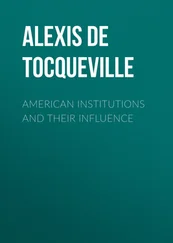Alexis de Tocqueville - Democracy in America - Volume 1
Здесь есть возможность читать онлайн «Alexis de Tocqueville - Democracy in America - Volume 1» — ознакомительный отрывок электронной книги совершенно бесплатно, а после прочтения отрывка купить полную версию. В некоторых случаях можно слушать аудио, скачать через торрент в формате fb2 и присутствует краткое содержание. Жанр: unrecognised, на английском языке. Описание произведения, (предисловие) а так же отзывы посетителей доступны на портале библиотеки ЛибКат.
- Название:Democracy in America - Volume 1
- Автор:
- Жанр:
- Год:неизвестен
- ISBN:нет данных
- Рейтинг книги:4 / 5. Голосов: 1
-
Избранное:Добавить в избранное
- Отзывы:
-
Ваша оценка:
- 80
- 1
- 2
- 3
- 4
- 5
Democracy in America - Volume 1: краткое содержание, описание и аннотация
Предлагаем к чтению аннотацию, описание, краткое содержание или предисловие (зависит от того, что написал сам автор книги «Democracy in America - Volume 1»). Если вы не нашли необходимую информацию о книге — напишите в комментариях, мы постараемся отыскать её.
libreka classics – These are classics of literary history, reissued and made available to a wide audience.
Immerse yourself in well-known and popular titles!
Democracy in America - Volume 1 — читать онлайн ознакомительный отрывок
Ниже представлен текст книги, разбитый по страницам. Система сохранения места последней прочитанной страницы, позволяет с удобством читать онлайн бесплатно книгу «Democracy in America - Volume 1», без необходимости каждый раз заново искать на чём Вы остановились. Поставьте закладку, и сможете в любой момент перейти на страницу, на которой закончили чтение.
Интервал:
Закладка:
In no country in Europe has the great social revolution which I have been describing made such rapid progress as in France; but it has always been borne on by chance. The heads of the State have never had any forethought for its exigencies, and its victories have been obtained without their consent or without their knowledge. The most powerful, the most intelligent, and the most moral classes of the nation have never attempted to connect themselves with it in order to guide it. The people has consequently been abandoned to its wild propensities, and it has grown up like those outcasts who receive their education in the public streets, and who are unacquainted with aught but the vices and wretchedness of society. The existence of a democracy was seemingly unknown, when on a sudden it took possession of the supreme power. Everything was then submitted to its caprices; it was worshipped as the idol of strength; until, when it was enfeebled by its own excesses, the legislator conceived the rash project of annihilating its power, instead of instructing it and correcting its vices; no attempt was made to fit it to govern, but all were bent on excluding it from the government.
The consequence of this has been that the democratic revolution has been effected only in the material parts of society, without that concomitant change in laws, ideas, customs, and manners which was necessary to render such a revolution beneficial. We have gotten a democracy, but without the conditions which lessen its vices and render its natural advantages more prominent; and although we already perceive the evils it brings, we are ignorant of the benefits it may confer.
While the power of the Crown, supported by the aristocracy, peaceably governed the nations of Europe, society possessed, in the midst of its wretchedness, several different advantages which can now scarcely be appreciated or conceived. The power of a part of his subjects was an insurmountable barrier to the tyranny of the prince; and the monarch, who felt the almost divine character which he enjoyed in the eyes of the multitude, derived a motive for the just use of his power from the respect which he inspired. High as they were placed above the people, the nobles could not but take that calm and benevolent interest in its fate which the shepherd feels towards his flock; and without acknowledging the poor as their equals, they watched over the destiny of those whose welfare Providence had entrusted to their care. The people never having conceived the idea of a social condition different from its own, and entertaining no expectation of ever ranking with its chiefs, received benefits from them without discussing their rights. It grew attached to them when they were clement and just, and it submitted without resistance or servility to their exactions, as to the inevitable visitations of the arm of God. Custom, and the manners of the time, had moreover created a species of law in the midst of violence, and established certain limits to oppression. As the noble never suspected that anyone would attempt to deprive him of the privileges which he believed to be legitimate, and as the serf looked upon his own inferiority as a consequence of the immutable order of nature, it is easy to imagine that a mutual exchange of good-will took place between two classes so differently gifted by fate. Inequality and wretchedness were then to be found in society; but the souls of neither rank of men were degraded. Men are not corrupted by the exercise of power or debased by the habit of obedience, but by the exercise of a power which they believe to be illegal and by obedience to a rule which they consider to be usurped and oppressive. On one side was wealth, strength, and leisure, accompanied by the refinements of luxury, the elegance of taste, the pleasures of wit, and the religion of art. On the other was labor and a rude ignorance; but in the midst of this coarse and ignorant multitude it was not uncommon to meet with energetic passions, generous sentiments, profound religious convictions, and independent virtues. The body of a State thus organized might boast of its stability, its power, and, above all, of its glory.
But the scene is now changed, and gradually the two ranks mingle; the divisions which once severed mankind are lowered, property is divided, power is held in common, the light of intelligence spreads, and the capacities of all classes are equally cultivated; the State becomes democratic, and the empire of democracy is slowly and peaceably introduced into the institutions and the manners of the nation. I can conceive a society in which all men would profess an equal attachment and respect for the laws of which they are the common authors; in which the authority of the State would be respected as necessary, though not as divine; and the loyalty of the subject to its chief magistrate would not be a passion, but a quiet and rational persuasion. Every individual being in the possession of rights which he is sure to retain, a kind of manly reliance and reciprocal courtesy would arise between all classes, alike removed from pride and meanness. The people, well acquainted with its true interests, would allow that in order to profit by the advantages of society it is necessary to satisfy its demands. In this state of things the voluntary association of the citizens might supply the individual exertions of the nobles, and the community would be alike protected from anarchy and from oppression.
I admit that, in a democratic State thus constituted, society will not be stationary; but the impulses of the social body may be regulated and directed forwards; if there be less splendor than in the halls of an aristocracy, the contrast of misery will be less frequent also; the pleasures of enjoyment may be less excessive, but those of comfort will be more general; the sciences may be less perfectly cultivated, but ignorance will be less common; the impetuosity of the feelings will be repressed, and the habits of the nation softened; there will be more vices and fewer crimes. In the absence of enthusiasm and of an ardent faith, great sacrifices may be obtained from the members of a commonwealth by an appeal to their understandings and their experience; each individual will feel the same necessity for uniting with his fellow-citizens to protect his own weakness; and as he knows that if they are to assist he must co-operate, he will readily perceive that his personal interest is identified with the interest of the community. The nation, taken as a whole, will be less brilliant, less glorious, and perhaps less strong; but the majority of the citizens will enjoy a greater degree of prosperity, and the people will remain quiet, not because it despairs of amelioration, but because it is conscious of the advantages of its condition. If all the consequences of this state of things were not good or useful, society would at least have appropriated all such as were useful and good; and having once and for ever renounced the social advantages of aristocracy, mankind would enter into possession of all the benefits which democracy can afford.
But here it may be asked what we have adopted in the place of those institutions, those ideas, and those customs of our forefathers which we have abandoned. The spell of royalty is broken, but it has not been succeeded by the majesty of the laws; the people has learned to despise all authority, but fear now extorts a larger tribute of obedience than that which was formerly paid by reverence and by love.
I perceive that we have destroyed those independent beings which were able to cope with tyranny single-handed; but it is the Government that has inherited the privileges of which families, corporations, and individuals have been deprived; the weakness of the whole community has therefore succeeded that influence of a small body of citizens, which, if it was sometimes oppressive, was often conservative. The division of property has lessened the distance which separated the rich from the poor; but it would seem that the nearer they draw to each other, the greater is their mutual hatred, and the more vehement the envy and the dread with which they resist each other's claims to power; the notion of Right is alike insensible to both classes, and Force affords to both the only argument for the present, and the only guarantee for the future. The poor man retains the prejudices of his forefathers without their faith, and their ignorance without their virtues; he has adopted the doctrine of self-interest as the rule of his actions, without understanding the science which controls it, and his egotism is no less blind than his devotedness was formerly. If society is tranquil, it is not because it relies upon its strength and its well-being, but because it knows its weakness and its infirmities; a single effort may cost it its life; everybody feels the evil, but no one has courage or energy enough to seek the cure; the desires, the regret, the sorrows, and the joys of the time produce nothing that is visible or permanent, like the passions of old men which terminate in impotence.
Читать дальшеИнтервал:
Закладка:
Похожие книги на «Democracy in America - Volume 1»
Представляем Вашему вниманию похожие книги на «Democracy in America - Volume 1» списком для выбора. Мы отобрали схожую по названию и смыслу литературу в надежде предоставить читателям больше вариантов отыскать новые, интересные, ещё непрочитанные произведения.
Обсуждение, отзывы о книге «Democracy in America - Volume 1» и просто собственные мнения читателей. Оставьте ваши комментарии, напишите, что Вы думаете о произведении, его смысле или главных героях. Укажите что конкретно понравилось, а что нет, и почему Вы так считаете.












